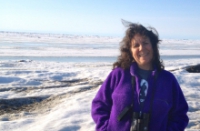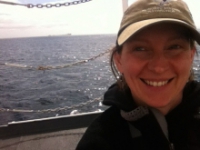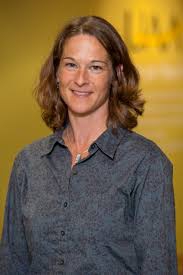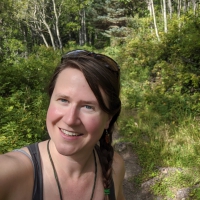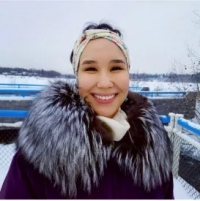Conference Organizers
The following individuals have been thinking about this conference for a long time and are passionate about the Arctic and in particular, community and citizen science. Together with the Steering Committee, we hope this will be the start of learning from one another and connecting with others participating in community and citizen science in the Far North. Contact us at accs [at] arcus.orgclass="spamspan".
Janet Warburton joined ARCUS in October 2000. Her primary focus as Project Manager is developing and implementing education related projects that help ARCUS meet its mission. For over a decade, she has administered ARCUS' signature education program, PolarTREC - Teachers and Researchers Exploring and Collaborating. She is also currently working The Arctic in the Classroom, a program that focuses on citizen science projects in the Arctic. She is currently ARCUS' representative for University of the Arctic.
Prior to joining ARCUS, she worked and lived in the Arctic in Kotzebue, Alaska. She has worked both with the federal government and local school districts developing and revamping science education programs to be more place-based as well as focus on both natural resource management and local knowledge. She has an extensive background in developing student programs, as well as a background in marine mammal management and environmental education. Outside of ARCUS, she has served as President of Alaska Natural Resource and Outdoor Education Association, treasurer on Alaska Science Teachers Association, and is advisor for Polar Educators International as well as a mentor for the Association of Polar Early Career Scientists.
Lisa (she/her) joined ARCUS in 2015 as a Project Manager. Lisa works on a variety of programs at ARCUS, including the Sea Ice for Walrus Outlook, the Arctic Indigenous Scholars Program, The Arctic in the Classroom, and others. Lisa earned BS and MS degrees in Wildlife Science at Oregon State University where she studied seabirds as indicators of climate change on St. Lawrence Island, AK. Her professional interests include the impact of changing climate on ecosystems and communities, equitable inclusion of Indigenous Knowledge in science, science communication, and marine ecology. Lisa lives on unceded Ramaytush Ohlone land in Pescadero, CA with her family.
Lisa has worked on a variety of citizen science projects, including the Coastal Observation and Seabird Survey Team (COASST) and as Director of the Haystack Rock Awareness Program in Cannon Beach, Oregon. She is also a big fan of citizen science apps, such as eBird, for broader participation in science (she gets pretty excited about her eBird yard list - 115 species so far!).
Audrey Taylor is an associate professor in the Department of Geography and Environmental Studies, University of Alaska Anchorage. Audrey earned her PhD in wildlife biology from University of Alaska Fairbanks and has conducted field-based research across the U.S., Central and South America, and China. Her current research focuses on Arctic-breeding shorebird populations with particular focus on the impacts of climate change and industrial development along Alaska's coastlines.
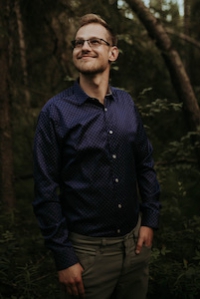
Jan Grzeda
Arctic Research Consortium of the U.S.Kuba joined ARCUS in September of 2019 as a project assistant and a year later became a project coordinator. He works across a variety of ARCUS programs, organizes virtual events, and works with the ARCUS board. Prior to joining ARCUS, Kuba worked on connecting commercial fishers and other small businesses in Southern Alaska with federal grant funding, was part of the facilitation team of the Fairbanks Air Quality Stakeholders group, and helped plan a number of conferences and other events throughout Alaska. Outside of work, he enjoys board games, trivia nights, working on his occasional podcast, and all manner of outdoor fun. He lives in Fairbanks and holds a BSc in Economics from Portland State University.
Steering Committee Members
We are very excited to be working with the following talented and passionate individuals as they help guide the conference planning and implementation. We asked each Steering Committee member to share their connections to community and citizen science as well as what they hope to see come out of this conference. We hope this helps you connect with each of our volunteers.
Communities that represent Annette (she/her): The Polar Citizen Science Collective
Having worked with data collected by non-scientists for my Ph.D., I am inspired by the power of the people to collect data and support research in all disciplines. The goal of The Polar Citizen Science Collective is to merge citizen science with tour operators to create opportunities for research and public education, leveraging the reach of polar travelers to enhance understanding and protection of the polar regions. Tour operators provide an extensive platform of opportunity for data collection. Their ships visit the Arctic for several months each year and therefore provide unique access to collect multi-annual data throughout an entire season.
I hope that this conference strengthens the Arctic community/citizen science network focusing on inclusion and the open sharing of knowledge. In the same way as community/citizen science projects benefit from collaboration amongst the participants, Arctic research will benefit from the exchange of ideas, approaches, and challenges encountered by scientists on a circumpolar scale.
Communities that represent Erica (she/her): Earthling, Settler, Dena’ina ełnena, Anchorage & Fairbanks, Spenardian
In 2008, I served in an interdisciplinary marine science internship at the Kachemak Bay Research Reserve and have been interested in participatory research programs and cross-cultural collaborations ever since. My daily work as a scientist has become fairly specialized so as a volunteer I'm able to connect with a more diverse array of community members and research projects than I would otherwise, which in turn makes me a better scientist. I became a member of the global Citizen Science Association in 2018 and served nearly two years as a part-time team member with SciStarter.org, an online hotspot for citizen science. As an attendee of the CitSci2019 global conference (where I also co-presented a workshop for SciStarter), I was deeply inspired by the evolving conversations and collaborations between communities and scientists.
During this conference, I look forward to expanding my connections with fellow Alaskans and scientists whose circumpolar projects identify as citizen or community science. I look forward to creating a safe space where a diversity of voices come together to share knowledge and wisdom and joy. I hope it will celebrate and strengthen our relationships with each other, and the plants, lands, waters, and greater ecosystems in which we can all thrive more responsibly.
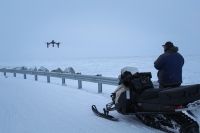
Dennis Davis
Dennis Davis is from Shishmaref, Alaska, and specializes in utilizing drone technology to help serve community needs. For many years, Dennis has utilized professional commercial-grade drones to serve multiple needs in the community of Shishmaref. Dennis helps monitor extreme coastal erosion, something that Shishmaref is famous for, as well as quickly changing sea ice conditions. Dennis also helps monitor the conditions of the ocean and sea ice during the spring marine mammal hunts, which are extremely important for the community of Shishmaref. Mr. Davis also utilizes drone technology during emergencies and crises, such as search and rescue operations. Dennis is also an expert at utilizing social media platforms to advocate for rural communities in Alaska. (Twitter: @eskimofixer)
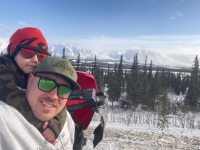
Kaare Sikuaq Erickson
Ikaaġun Engagement, LLCCommunities that represent Kaare (Inuk): Unalakleet, Inuit Nunaat
I have connections to most communities in north and west Alaska, as well as ties to many large and small community/citizen science projects in the Arctic. Ikaagun is currently working on two projects directly related to community/citizen science in Arctic research: (1) an international community-based science initiative in my hometown of Unalakleet; and (2) an initiative to write Arctic research protocols by Inuit from across Inuit Nunaat for visiting researchers.
Through this conference, I hope we are able to take steps towards a better understanding of: (1) what makes Arctic community-based and citizen sciences unique in relation to cultural and geographical gaps between the sciences and the communities/citizens in the Arctic; (2) what separates 'community-based' and 'citizen' sciences in Arctic research; and (3) a productive pathway forward for community/citizen science cohorts in Arctic research.
Communities that represent Roberta (she/her): Utqiagvik, North Slope, and western Alaska coastal communities
I work with a community-based erosion monitoring network in western Alaska to document changing coastline positions through time. I also work with a network of community-based observers in Arctic Alaska to document weather, sea, and wildlife phenomena from the perspective of local hunters and community members.
I hope to learn how to better work with rural Arctic communities in research. I hope to hear from other folks who are doing community-based science work and learn from them.
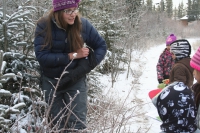
Katie Spellman
International Arctic Research Center (University of Alaska Fairbanks)Communities that represent Katie (she/her): Fairbanks (through and through!)
I love community and citizen science! I have designed and/or coordinated ten large citizen and community science programs that have engaged several thousands of Alaskans on environmental change topics. I come to this effort as a scientist who uses the data, a practitioner who designs programs to try to maximize learning and actionable science production, and a volunteer who participates in Arctic community based monitoring and citizen science. My research focuses on: (1) the ways we do community and citizen science in the Arctic and the tradeoffs between different models of citizen science, from small co-created projects to large scale contributory programs; and (2) the ways plant communities (especially berries) are responding to climate change using community science approaches.
I hope we can increase the awareness of the breadth and depth of community science projects in our region and help define how the process can be done in the Arctic with practices centered in diversity, equity, inclusion, and justice.

